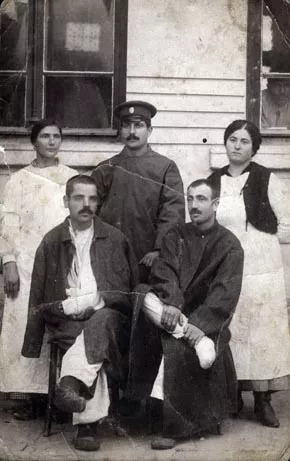This is a photo of my father Mihael Kohen and his brother Azarya Kohen during their military service in World War I in 1916 when they met in the hospital in Stara Zagora after they were wounded on the Turkish battle front. The photo was taken in Stara Zagora. My father (first from left in the first row) and his brother are sitting on the photo. They took a photo of themselves together with the hospital attendants and another soldier.
My father Mihael Kohen tried many things in life. He spent eight years in captivity during World War I. He was held captive by the French army near Thessaloniki as a soldier from the Bulgarian army. After that he worked as a tinsman. He took part in the construction of the roof of the first building of the Sofia University. He traded with second-hand products. Later, together with an uncle of my mother's Chelebi Haravon, and with the active help of my uncle Mois Haravon, he managed to set up a haberdashery on Lomska Street [present-day George Washington Street, near the central Sofia synagogue], but those were the years of the great crisis in 1929-1932 and he was forced to close it down. Then he started work as a street vendor and walked around the neighborhood with a tray selling elastic cords, tights and haberdashery. Then he made a warehouse selling coal near our house. At that time people could not afford to buy a lot of coal and came to buy 5-10 kilos. In this way my father was able to support us and helped the people in the neighborhood. That continued until the passing of the anti-Jewish laws when he was forbidden to work.
My parents met in an interesting way. During World War I or probably in the end of the war, my uncle Azarya Koen was injured and was sent to the family of my mother in Kyustendil to be looked after. There he decided that my mother would be the perfect for wife for his brother, my father. After the war ended and my father returned from captivity, his brother Azarya told him that he had found a very nice girl from Kyustendil for him. My father retorted that he did not need a wife and Azarya should marry her if he liked her so much. But his brother was already married. There were other attempts to bring them together at that time. But in the end, they met by accident when my mother came from Kyustendil to visit her brother Buko Haravon. Later it turned out that she was the girl that uncle Azarya was talking about to my father. They liked each other and got married. Their wedding was in 1922 in Sofia. In my family my mother did all the housework and she helped my father who had a warehouse for coal near our house.
My father had three brothers - Eliyah, Rafael and Azarya Kohen. The eldest one, Eliyah Kohen, was a cobbler. The next one, Rafael Kohen had a workshop for mending shoes in the center of the town. He took to drinking and lived very miserably. Before going home, he would stop in a pub and since he was in much debt, he had to get home using less traveled roads so that he would not meet any of the people whom he owed money. Later he moved his workshop in our house. The third brother of my father Azarya worked as an adolescent for the Arie family in Samokov. That was a rich family, whose house is now a museum. The Arie were in the leather and the banking business. My uncle was a leather worker. He worked for free, because my grandfather had taken money from them to build his house. There my uncle learned the craft and decided to start a leather business by himself. He also lived in the Jewish neighborhood on Shar Planina Street and Tri Ushi Street. I had a lot of cousins in Sofia. There were nine children in the families of my uncles who lived in our yard. Uncle Eliyah had four children - Mindusha, Moshe, Sofka and Hemda, and uncle Rafael - five - Buka, Simanto, Nissim, Elazar and Milka. Uncle Rafael married Buka-Miriam (nee Toledo) who was from Provadia. Uncle Azarya had a girl - Hemda, who lived and died in Sofia. His wife's name was Buka, nee Konfino and was born in Shumen.

















































